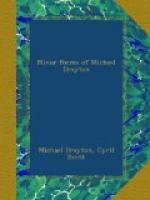[Footnote 5: Elegy ix, p. 113.]
[Footnote 6: Cf. Morley’s ed. of Barons’ Wars, &c. (1887), p. 6.]
[Footnote 7: Cf. E.H. Ep. ‘Mat. to K.J.,’ 100 sqq., &c.]
[Footnote 8: Professor Courthope and others. There was some excuse for blunders before the publication of Professor Elton’s book; and they have been made easier by an unfortunate misprint. Professor Courthope twice misprints the first line of the Love-Parting Sonnet, as ’Since there’s no help, come let us rise and part’, and, so printed, the line supports better the theory that the poem refers to a patroness and not to a mistress. Cf. Courthope, Hist. Eng. Poetry, iii. pp. 40 and 43.]
[Footnote 9: Cf. E. and Phoebe, sub fin.; Shep. Sir. 145-8; Ep. Hy. Reyn. 79 sqq.]
[Footnote 10: Those reprints which were really new editions are in italics.]
[Footnote 11: 1594 ed., Pref. Son. and nos. 12, 18, 28; 1599 ed., nos. 3, 31, 46; 1602 ed., 12, 27, 31; and 1603 ed., 47.]
[Footnote 12: Meres thought otherwise. Cf. Palladis Tamia (1598), ’As Accius, M. Atilius, and Milithus were called Tragediographi, because they writ tragedies: so may wee truly terme Michael Drayton Tragaediographus for his passionate penning the downfals of valiant Robert of Normandy, chast Matilda, and great Gaueston.’ Cf. Barnefield, Poems: in diuers humors (ed. Arber, p. 119), ’And Drayton, whose wel-written Tragedies, | And Sweete Epistles, soare thy fame to skies. | Thy learned name is equall with the rest; | Whose stately Numbers are so well addrest.’]
[Footnote 13: Cf. Meres, Palladis Tamia (1598), ’Michael Drayton doth imitate Ouid in his England’s Heroical Epistles.’]
[Footnote 14: Cf. id., ibid., ’As Lucan hath mournefully depainted the ciuil wars of Pompey and Caesar: so hath Daniel the ciuill wars of Yorke and Lancaster, and Drayton the civill wars of Edward the second and the Barons.’]
[Footnote 15: Cf. Elegy viij. 126-8.]
[Footnote 16: Cf. Morley’s ed., Barons’ Wars, &c., 1887, pp. 6-7.]
[Footnote 17: Cf. Elron, pp. 83-93, and Whitaker, M. Drayton as a Dramatist (Public. Mod. Lang. Assoc. of America, vol. xviij. 3).]
[Footnote 18: Cf. Nl. ij. 127 sqq., p. 172.]
[Footnote 19: Cf. Elegy ij. 20.]
[Footnote 20: Cf. Palladis Tamia: ’Michael Drayton is now in penning, in English verse, a Poem called Poly-olbion, Geographicall & Hydrographicall of all the forests, woods, mountaines, fountaines, riuers, lakes, flouds, bathes, & springs that be in England.’]
[Footnote 21: Cf. Amours (1594), xx and xxiv.]
[Footnote 22: Cf. Sonnet vj (1619 edition); which is a dignified summary of much that he says more coarsely in the Moone-Calfe.]




